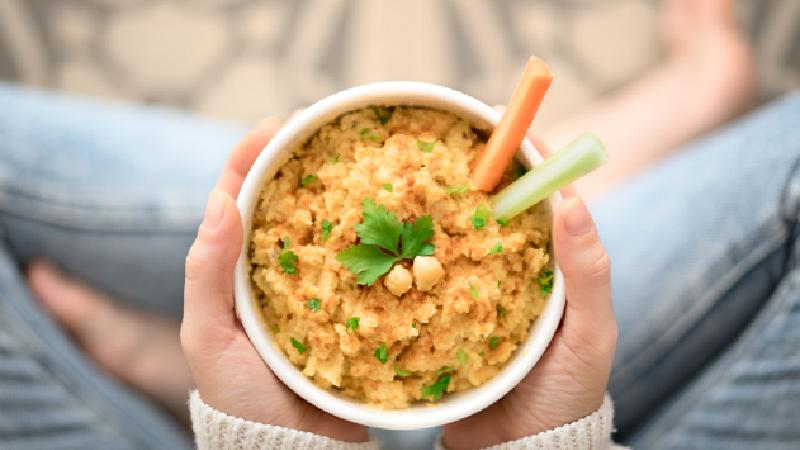9 Ways to Stay Full Longer – Are you always hungry? Do you find yourself snacking more often than you’d like? If so, you’re not alone. Many people struggle with hunger and appetite control, but there are ways to stay full longer. There are many options for curbing hunger, from avoiding foods that trigger medical conditions like IBS to simply eating more protein-rich foods. Here are nine tips to help keep those hunger pangs at bay.
1) Eat When You’re Hungry
Time to check in with your body, mind and emotions to ensure you’re actually hungry before you eat. People reach for food when they’re thirsty, tired, stressed, bored or angry — not just when they’re physically hungry. To help better understand your hunger cues and avoid unnecessary eating, try drinking a glass of water or taking a quick nap instead of reaching for a snack.
2) Eat More Protein
Protein helps regulate hunger hormones and can help you feel fuller for longer. Aim to include protein at every meal and snack, such as eggs for breakfast, a chicken salad for lunch or cottage cheese for a snack. It’s especially important as we get older, as one-third of aging adults don’t eat adequate protein. So build those good habits early.
3) Avoid Refined Carbs
Refined carbs are quickly digested and can cause spikes in blood sugar levels, leading to hunger soon after eating. They’re often found in processed foods like cakes, cookies, white bread and pastries. They’re also empty calories and can lead to unwanted weight gain. To stay fuller for longer, choose complex carbs instead, such as whole grains, fruits and vegetables.
4) Combine Your Carbs with Protein
Having an apple, some carrot sticks or even a bowl of oats with blueberries are all healthy ways to snack. However, adding protein to these meals is an excellent way to improve satiety and keep you feeling full longer, according to research. So have a couple of hardboiled eggs alongside the apple, dip those carrots in hummus and add some pepitas and almond slices to your oat bowl.

5) Eat More Fiber
Fiber helps to keep you regular and can also help you feel fuller for longer. Good sources of fiber include beans, legumes, fruits, vegetables and whole grains. Most women need about 25 grams of fiber per day, while men are in the 30 to 35 range.
Unfortunately, many only get about half of that. If you’re having trouble getting it from your foods, consider a capsule or powder supplement. Just make sure to drink plenty of fluids when you up your fiber intake, as it can cause bloating if you don’t.
6) Don’t Forget Fats
Since we’re discussing food and macronutrients, we absolutely have to touch on fats. Ensuring you’re getting enough healthy fats in your diet is key for keeping cravings at bay that you may mistake for hunger. Good sources of healthy fats are avocados, nuts and seeds, nut butters, olive oil and fatty fish like salmon. Just be mindful of portion sizes, as fats are very calorie-dense.
7) Address Food Allergies and Sensitivities
According to a major global study conducted in thirty-three countries and across six continents, more than 40% of people live with at least one functional gastrointestinal disorder. Diet was identified as a significant contributing factor to these kinds of issues.
And when we suffer from conditions like leaky gut, we’re more likely to experience hunger and cravings because our bodies are malnourished. So if you suspect you have a food allergy or sensitivity, take some time to learn about contributing factors like FODMAPs and gluten or lactose allergies. These can lead to irritable bowel syndrome, celiac disease and more. You can also work with a holistic care specialist or other healthcare professionals to get to the root of the problem and develop an IBS diet plan, find a low FODMAP diet plan or a different dietary protocol.
8) Don’t Skip Meals
Skipping meals can make you hungrier later on and more likely to make unhealthy choices when you finally do eat. Instead, eat three regular meals per day, plus snacks as needed. And if you know you’ll be skipping a meal for some reason, make sure to pack a nutritious snack to tide you over until your next meal. If you’re having trouble with eating correctly and sticking to a solid schedule, use meal prep services that specialize in healthy eating to your advantage. A couple of examples are:
- Mediterranean Diet – A Mediterranean diet meal delivery service is right for you if you enjoy flavorful yet healthy food. It focuses on fruits, vegetables, whole grains, legumes, nuts, seeds and olive oil. And it’s the world’s number-one-ranked diet.
- Low Sodium – 90% of Americans over two years old consume more than the recommended daily intake of sodium. If you’re trying to lower your intake, look for a meal delivery service specializing in low sodium meals.

9) Stay Hydrated
We already mentioned ensuring you drink enough water, but it’s worth mentioning again. In addition to causing hunger, dehydration can also cause headaches and fatigue. As studies show, it’s harder to resist the temptations of snacking when we’re sleepy or feeling run down. And we certainly don’t make the best food decisions when we get into this state. So make sure you’re drinking plenty of water throughout the day, especially when you feel yourself flagging.
10) Healthy Habits Take Time
Developing healthy habits that help you stay full longer should be considered a work in progress. As your food preferences, activity levels, and stressors change, so should your approach to hunger. But the tips we’ve given you here are a great starting point for anyone looking to get a handle on their hunger. Just remember that if you’re always hungry, there’s probably a reason why. Once you figure out what that reason is, you can take steps to address it and get your hunger under control.


